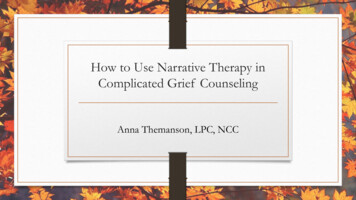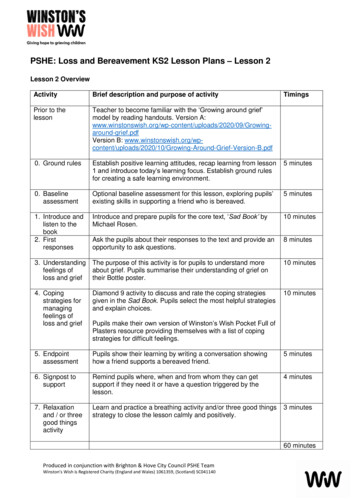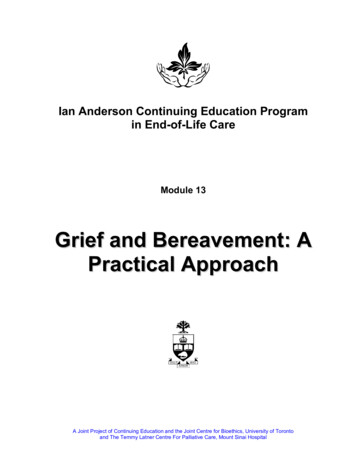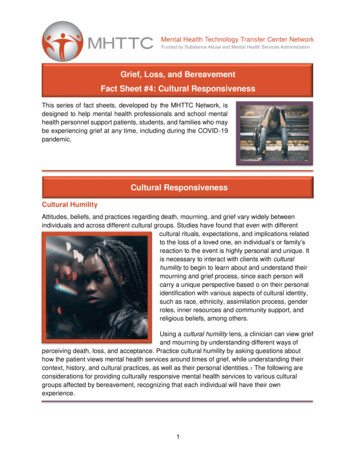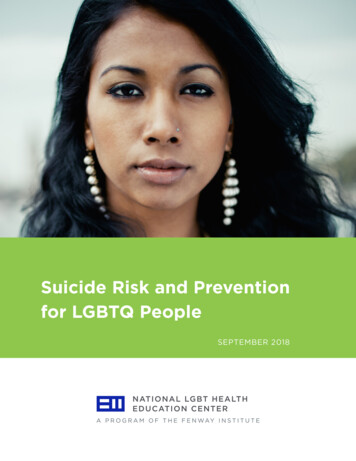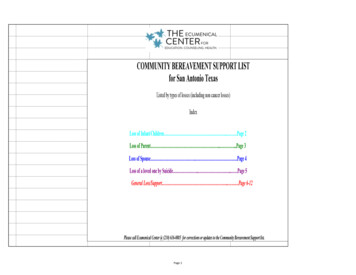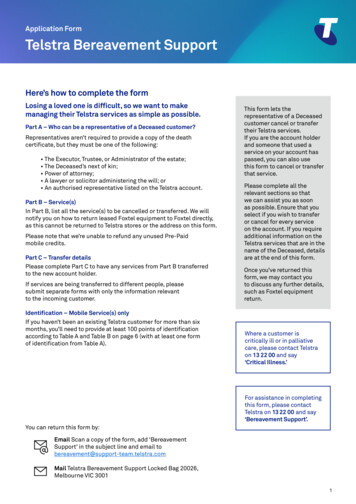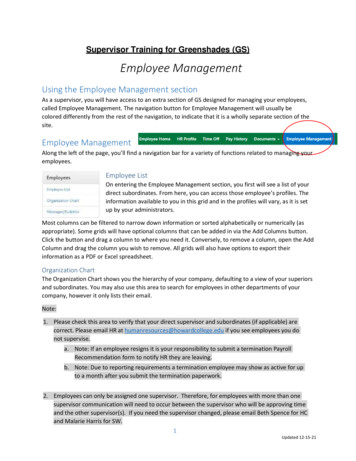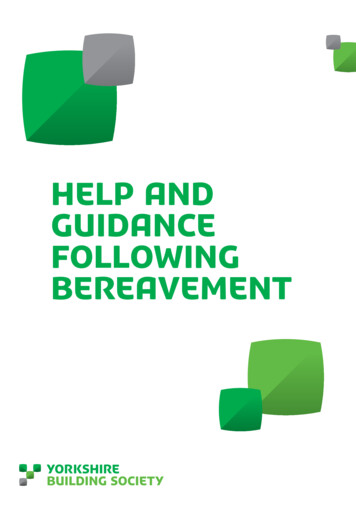
Transcription
Helping you dealwith bereavementIn this guide you will find practical guidance and professionalexpertise to help you through this difficult time.
Bereavement Guide IntroductionAbout this guideThe death of someone close is alwaysa difficult time. Dealing with practicalmatters and making financial decisionscan seem overwhelming. We want tomake things as simple as we can.This guide aims to support youthrough the steps and decisions. The first part outlines the initialsteps you’ll need to take, such asregistering the death, obtainingthe will and arranging the funeral. This information has beenproduced for the UK. If thedeceased was resident inanother country the laws andrequirements may differ. Youshould take local legal advice inthe country of residence if you’reunsure what to do.We hope you find this informationuseful. Please remember it is just aguide and not all the details will applyin every case. The second part includesa checklist of some of theorganisations you may needto inform. The final section contains somecontact information you mightfind useful.2
Bereavement Guide First StepsWhat to do firstThere are a number of things that you need to do assoon as possible after someone has died.1. Get a medical certificateThis will be issued by the hospital, GP or Coroner.You’ll need this to register the death.2. Register the deathYou need to do this at a Register Office within five days of the death.You can find your local office at gov.uk/register-offices3. Locate the WillThis document is important as it could contain funeralwishes and will help you understand your next steps.4. Arrange the funeralYou can arrange this by yourself or with a funeral director.5. Inform organisationsYou’ll need to inform a number of organisations.We’ve prepared a checklist for you to use.3
Bereavement Guide First Steps2. Registering the deathYou must register a death within fivedays (eight in Scotland) or when thecoroner gives permission. You’ll needto take the medical certificate fromthe hospital or your GP to the registryoffice, along with the deceased’s: Birth certificate Marriage or civil partnershipcertificate National Insurance (NI) number Proof of address (e.g. utility bill) Driving licence PassportIt will also help to have the full name,date of birth and NI number of asurviving spouse or civil partner.You can do this at any RegisterOffice, but if you do it in the districtwhere the person died, you’ll get thedeath certificate straight away. It’sfree and takes about 30 minutes, butit’s best to make an appointment.The registrar will give you one freedeath certificate, but it’s a good ideato pay for several copies, as youmay need them for various financialorganisations. There is a minimalcharge for this. Alternatively you canorder copies from gov.uk/order-copybirth-death-marriage-certificate for 11 each.The registrar can also give you detailsabout the Tell Us Once service. Thisis a quick way of informing mostgovernment departments at once,such as HM Revenue and Customs(HMRC), Driver and Vehicle LicensingAgency (DVLA), Department for Workand Pensions (DWP) and the localcouncil tax office.4
Bereavement Guide First Steps3. Locating the WillA will contains the last wishes of aperson who has died. It may containdetails about the type of funeral theywant or if they‘ve made any provisions topay for it.If you can’t find a will at the deceased’shome, check with their solicitor, bankor financial adviser if they have it.There is also a government websiteyou can check: gov.uk/search-willprobate. You just need the deceased’ssurname and year of death. You canorder copies for 10 each.At this stage, you may want to get legaladvice, if you haven’t done so already.If you choose to do this, you’ll need toappoint a solicitor and there will be acharge for this.If there is a will A will is a legal document whichindicates who should benefit fromthe deceased’s estate. This iseverything owned or owed by theperson who has died. An executor is the person orprofessional named in a will tocarry out the instructions in thewill. The executor’s role is tolocate all assets, pay off taxes anddebts and distribute the leftovermoney, possessions and propertyto the beneficiaries. A beneficiary is a person whoinherits all or part of the estate. Probate is the legal right todeal with a deceased person’sestate. The Grant of Probate isthe document validating the willand authorising the executor toadminister it. You can contact theHMRC probate line on 0300 1231072 for help with this.5
Bereavement Guide First Steps3. Locating the WillIf there is no will If someone dies without a will,they’re said to have died intestate. An administrator is the personappointed to distribute the estate ifsomeone dies without a will. The administrator may need toapply for a Grant of Letters ofAdministration instead of a Grantof Probate. To find out more about what to do ifthere is no will, visit gov.uk/inheritssomeone-dies-without-willIf you need to pay the bill before probate is granted, we mightbe able to help you. Contact us if you need the money from theReAssure policy to do this. We’ll look at each case individuallyand might need to see the bill in order to make our decision.6
Bereavement Guide First Steps4. Arranging the funeralOnce the death has been registered,you can arrange a funeral. Mostpeople use a funeral director whowill help you make the necessaryarrangements.Paying for the funeralMany people find it difficult to cover thecost of a funeral but help is available,especially if you’re on low income.You’ll find advice on paying for funeralson the government website, gov.uk/bereavement-support-paymentYou can also discuss the situation withyour funeral director, who may be ableto put you in touch with organisationsthat can help. To find a funeral directorvisit NAFD.org.uk or SAIF.org.ukIf the proceeds from this policy are being paid to the estate andyou’re relying on this money to cover the funeral costs, we’rehappy to contact the Funeral Directors to let them knowthat the benefits from the policy will be used to settle thefuneral bill.7
Bereavement Guide First Steps5. Informing organisationsWhat documents do we need to see?So that we can release the money as quickly as possible, we’llneed to see certain documents. We’ve already have sent youour ‘What we need from you’ guide which lists the differentdocuments we will need for each scenario. We might needadditional information depending on the circumstances.Where the policyholder had divorced after the policy started we’llneed to see the final order (formerly known as ‘Decree absolute’).If you don’t have this, you can get a copy from the court where theoriginal was issued. You can find out more at: orce.If the death occurred abroad, we’ll need a Death AbroadQuestionnaire and possibly also the official Medical Cause ofDeath Certificate. If the certificates are not in English we’ll sendthem to be translated. Please contact us if this applies to you.8
Bereavement Guide First Steps5. Informing organisations (cont.)You’ll need to contact all relevantfinancial, utility and governmentorganisations to let them know whensomeone has died. We’ve put togethera suggested checklist to help you out.The details won’t apply to everyone, butmight be a useful start.The Bereavement Advice Centre offersa free service to contact up to tenorganisations. You can contact themat: ou can also register with theMailing Preference Service to stopunwanted post: mpsonline.org.uk/consumer/register9
Bereavement Guide ChecklistChecklistHome Landlord . Telephone – landline . Telephone – mobile . Internet . Milkman . Post office . Council . Electricity provider . Gas provider . Email account provider . Household help .Health GP . Dentist . Chemist . Optician . Home nursing help .10
Bereavement Guide ChecklistChecklistFinancial Banks/building societies . HMRC . Pension providers . Insurance companies . Credit card providers . Accountant . Financial adviser . Shareholdings . National savings and investments .Other Employer/former employer . Hairdresser . Library . Magazine subscriptions . Church . Gym .11
Bereavement Guide Useful InformationUseful informationGeneral guidanceCitizens Advice Bureaucitizensadvice.org.ukBereavement uidancegov.uk/after-a-deathTell Us Once o-contact-and-tell-us-onceHM Revenues & Customsgov.uk/hmrcRegistering the deathGeneral Register Officegov.uk/general-register-officeFuneral arrangementsNational Associationof Funeral he Society of Allied andIndependent Funeral Directorssaif.org.uk/members-searchWills and probateWills, Probate & Inheritancegov.uk/wills-probate-inheritanceIf there is no ter to stop direct mailMailing Preference Servicempsonline.org.uk/consumer/registerNational Records for Scotlandgov.uk/national-records-of-scotland12
Bereavement Guide Useful InformationUseful information (cont.)Emotional supportBereavement Advice Centrebereavementadvice.org0800 634 9494Financial supportMoneyHelpermoneyhelper.org.uk0800 138 7777NHS Bereavement supportnhs.uk/livewell/bereavementGovernment financial supportgov.uk/bereavement-support-paymentCruse Bereavement Centrecruse.org.uk0808 808 1677Widowed parent’s ssamaritans.org.uk116 123Grief Encountergriefencounter.org.uk020 8371 8455PensionsPension Service Helplinegov.uk/find-pension-contact-details0345 606 0265Age UKageuk.org.uk020 7278 1114Child Bereavement UKchildbereavementuk.org01494 568900National Association of Widowsnawidows.org.uk13
Get in touchreassure.co.uk0800 073 1777ReAssure Ltd Registered office: Windsor House, Telford Centre,Telford, Shropshire TF3 4NB Registered in England No. 754167ReAssure Limited is authorised by the Prudential Regulation Authority and regulated by the Financial Conduct Authority andthe Prudential Regulation Authority. Firm reference number 110495. Member of the Association of British Insurers.RE0617 221-0634 Bereavement Guide
reassure.co.uk 0800 073 1777 ReAssure Limited is authorised by the Prudential Regulation Authority and regulated by the Financial Conduct Authority and the Prudential Regulation Authority. Firm reference number 110495. Member of the Association of British Insurers. RE0617 221-0634 Bereavement Guide
